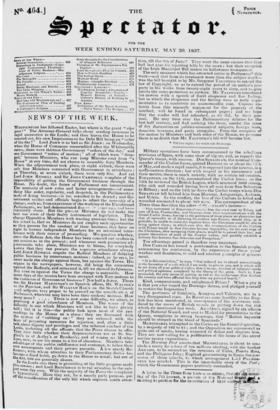NEWS OF THE WEEK.
'WHITSUNTIDE has followed Easter, but where is the great "ripe pear?" The Attorney-General talks about sending measures in rapid succession to the Lords; and then leaves the House to be counted out, his own Imprisonment for Debt Bill being an "order of the day !" Lord JOHN is as bad as Sir JOHN: on Wednesday, when the House of Commons reassembled after the Whitsuntide recess, there were thirteen Government "orders of the day," and sae Government "notice of motion ;" all of which were "drop- ped,' because Ministers, who can (any Minister can) form "a House" at any time, did not choose to assemble forty Members. When the adjournment took place, at eight o'clock, there were only four Members connected with Government in attendance : on Thursday, at seven o'clock, there were only five. Anil yet Lord JOHN Russets. and Sir JOHN CAMPBELL complain of the impossibility of getting the Government business through the House. No doubt, the forms of Parliament are inconvenient. The necessity of new rules and better arrangements—of some- thing like order, regularity, and despatch, in the Parliamentary mode of' doing business—is too manifest to be denied ; and Go- vernment scribes and officials begin to admit the necessity of a change, such as, from experience of the working of the Unreformed Parliaments, we had demonstrated five sr :s ears ago, and hsss repeatedly since. But the press nt Ministers do nut make the Lest use even of their faulty instrument of legislation. They charge Opposition Members with wasting precious time; but the fair retort is, that as Ministers do not employ such opportunities as they possess for the conduct of their business, they have no right to lecture independent Members for an occasional inter- ference with their course of proceeding. We question whether, since the Reform Act, the House has been counted out so often in any session as in the present; and whenever such premature ad- journments take place, Ministers are to blame, for everybody kaows that they can procure the requisite attendance always. Lord JoHN Russets acquits the Radical Members of delaying public business by unnecessary motions : indeed, as he sass, he never made the chayge against them, but against the Tories. His organs in the newspapers, however, did bring the accusation against the Rudicals, and reiterated it, till we showed its falseness. Bet even as against the Tories the charge is untenable. How many days of the session have been occupied with Tory motions to the exclusion of Government business ? Not half a dozen. There was Sir HENRY HARDINGE'S on Spanish affairs, Mr. WALTER'S os the Poor-law, and Sir Wittiam RAE'S on the Scotch Church —all subjects very proper to be pressed on the considelati in of Parliament, whatever may have been their authors' motives. How many mole' . . . . There is now some difficulty, we admit, in procuring a good attendance of Members. The cause of the difficulty is one which Ministers will not like to have plainly told ; but it is this—the public look upon most of the pro- ceedings in the House as a sham : they are disgusted with the system of "rubbing on r " they are sickened with the UAW of preparing measures for rejection, and, after a little
talk about dignity and privileges and the indecent conduct of the
Lords, pocketing all the affronts that the Peers choose to offer. They cure little whether their Representatives are at St. Ste- or itt Astley's or Brookes's; and of course no Member tears, now, to see his name in a list of absentees. Members take advantage of the public indifference and contempt, to follow their own amusements and their private pursuits. A few sturdy Re- formers, with whom attention to their Parliamentary duties has become a fixed habit, go down to the House as usual; but out of the 658, GOO are generally absent. the Lords also there is grumbling at the little progress made this session ; and Lord BROUGHAM is to cal: attention to the sub- pet some day soon. With the majority of the Peers the complaint 15 bypecritical. Have they not, for a merely party purpose, put off the consideration of the only bill which requires much atten- lion, till the 9th of June? They want the same excuse that they had last year for rejecting bills by the score ; but their reception of the Irish Municipal Bill makes its hollowness transparent. The only measure which has attracted notice in Parliament* this week—and that from its treatment more than the subject itself— was the bill brought in by Mr. Sergeant TALFOURD to amsnd the law of Copyright, so as to extend the period of an author's pro- perty in his works from twenty-eight years to sixty, and to give artists the same protection as authors. Mr. TALFOURD introduced his motion with a speech of florid, eloquence and fine feeling, but in which the eloquence and the feeling were so truly argu- mentative as to constitute an unanswerable ease. Copious ex- tracts from this masterly argument for the property of the intellect, will be found in subsequent pages ; and we hope that the reader will feel refreshed, as we did, by their per- usal. Ho may turn over the Parliamentary debates for the last half century, and find nothing like them, amidst the mass of dry discussions on politico-economical subjects, foreign wars, domestic treasons, and party struggles. From the receptwa of the motion by Ministers and both sides of the House, we presume there is no doubt that Mr. TALFOURD'S bill will become law.
• Till last night; tor which vide. Postscript.


























